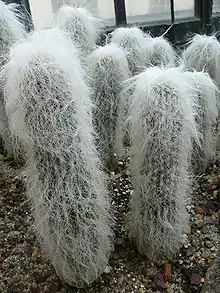Arachnoid organs, such as leaves or stems, have an external appearance similar to cobwebs – the appearance of being covered with fine, white, usually tangled hairs. This can cause plants to appear grey or white.[1] The arachnoid appearance is common on the leaves and stems of various sclerophyllous members of the family Asteraceae, such as some thistles. The arachnoid appearance of Haworthia arachnoidea arises from the spinescent leaf denticles, and the arachnoid appearance of the cactus Cephalocereus senilis is from long-lasting hairy spines.
 Eriocephalus africanus, showing lightly arachnoid leaves and heavily arachnoid seed follicles
Eriocephalus africanus, showing lightly arachnoid leaves and heavily arachnoid seed follicles
 Haworthia arachnoidea, the cobweb aloe, has a spidery appearance.
Haworthia arachnoidea, the cobweb aloe, has a spidery appearance. Cephalocereus senilis has an arachnoid effect created by modified spines.
Cephalocereus senilis has an arachnoid effect created by modified spines.
See also
References
- ↑ Jackson, Benjamin Daydon (1928). A Glossary of Botanic Terms with their Derivation and Accent (4th ed.). London: Gerald Duckworth & Co. Retrieved 27 December 2022 – via Biodiversity Heritage Library.
This article is issued from Wikipedia. The text is licensed under Creative Commons - Attribution - Sharealike. Additional terms may apply for the media files.